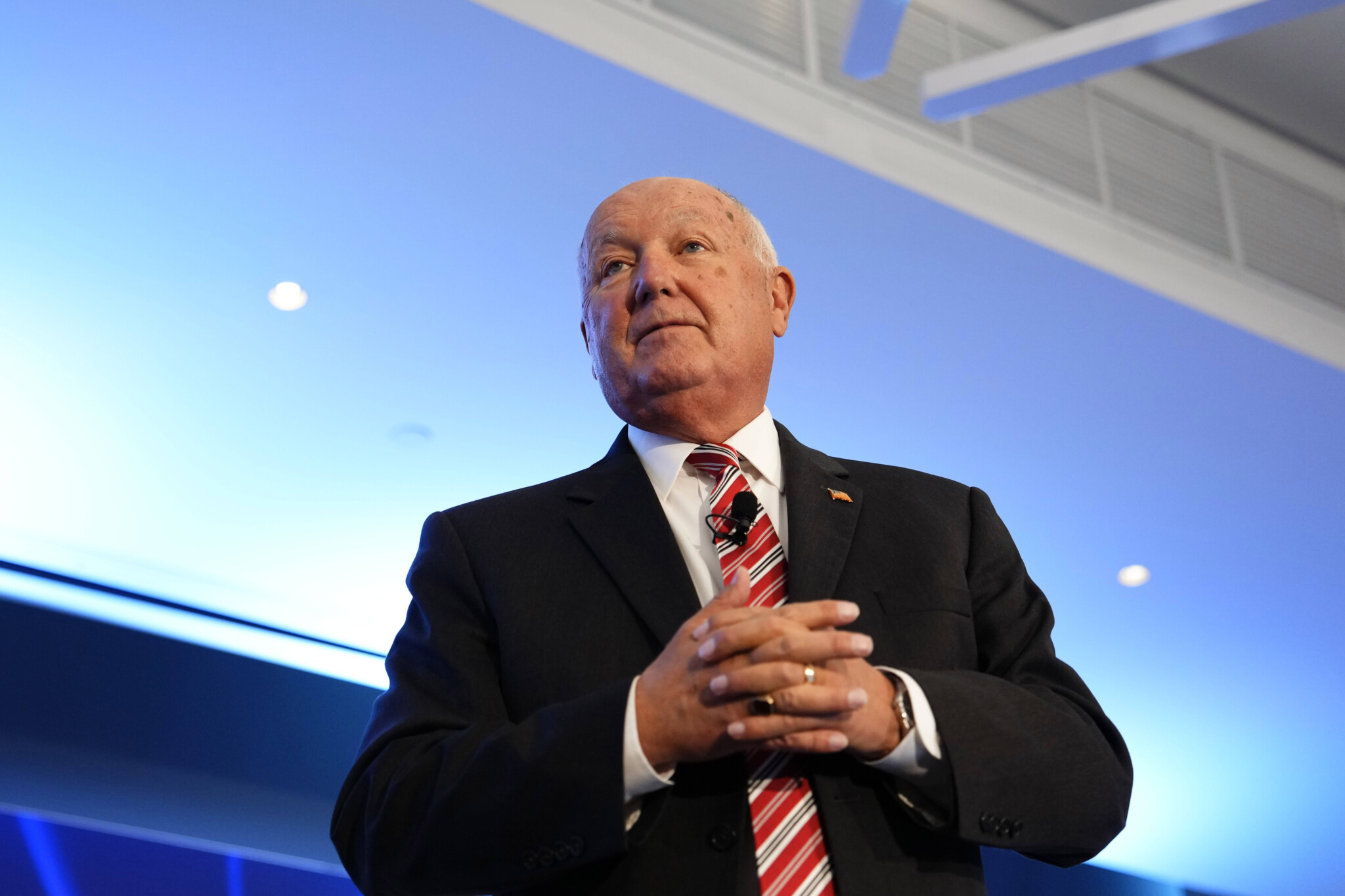U.S. Ambassador to Canada Pete Hoekstra and Alberta Premier Danielle Smith highlighted the strong economic partnership between Alberta and the United States—in an exclusive interview on The Hub’s Alberta Edge podcast—during a multi-day visit to the province. Their discussions come as Canada and the U.S. prepare for lengthy Canada-United States-Mexico Agreement (CUSMA) renegotiations that could extend into 2027, with some provinces maintaining trade barriers on American products.
The Hub spoke with both leaders to better understand Alberta’s distinctive approach to Canada-U.S. relations and the province’s strategy for navigating upcoming trade negotiations.
Here are five key takeaways from the conversation:
1. Alberta prioritizes business relationships over political tensions with the United States: Premier Smith explained how the wild rose province is focusing on job creation and economic prosperity in its relationship with U.S. counterparts.
2. CUSMA renegotiations will likely extend well beyond 2026: Due to the complexity of negotiations and U.S. electoral timing, renegotiations could potentially last until 2027.
3. Energy cooperation remains the cornerstone of Alberta-U.S. relations: The premier and U.S. ambassador discussed significant room for expansion in the trade relationship for both traditional and high-tech sectors.
4. Defence partnerships through NORAD face potential challenges: Some Canadian politicians and high-profile voices question the security relationship with the U.S., which could cause issues for the relationship between the two countries in defending the Arctic.
5. Provincial approaches to U.S. relations vary significantly: Premier Smith explained how Alberta is taking a more friendly stance than other provinces on trade issues.
Alberta prioritizes business relationships over political tensions
Premier Smith and Ambassador Hoekstra emphasized Alberta’s pragmatic approach to Canada-U.S. relations, with the province maintaining a business-first mentality despite broader political tensions.
“We’re focused on business, okay. We’re focused on how we create jobs and prosperity for Albertans and how we do that in a way that benefits Albertans and makes a good deal for the United States,” Hoekstra explained, praising Alberta’s approach.
The ambassador noted that while anti-American sentiment exists in some parts of Canada, Alberta has chosen a different path. “In Alberta, it appears that your government and your business people…recognize that [reality] and say, ‘Okay, that’s the reality I work with,’” he said, describing the province’s forward-looking approach as beneficial to both countries.
Alberta’s government has recently demonstrated its commitment to understanding and strengthening Canada-U.S. relations by launching the New North American Initiative last May, a research centre led by the University of Calgary’s School of Public Policy. The province is investing $6.5 million over three years into the initiative, which will bring together post-secondary institutions and universities on both sides of the border to study the political and economic dynamics between the two countries. The research centre was established in response to shifting dynamics in the bilateral relationship and aims to provide “radical rethink and reenvisioning of what is possible” with American federal and state governments.
CUSMA renegotiations will likely extend well beyond 2026
Both leaders acknowledged that the upcoming CUSMA review process will be lengthy and complex, potentially extending well into 2027 due to political timing and the scope of negotiations required.
The comment period for public and business input has begun in both countries, signaling that negotiators expect extensive discussions. “It’s going to be a long process of negotiation, going through it page by page, product by product, tariff level by tariff level,” Hoekstra explained.
The timing presents additional challenges, as negotiations are expected to conclude around the 2026 U.S. midterm elections. “For an agreement like that, it has to be validated and confirmed by the U.S. Senate, and it’s going to be hard to do that in an election season,” the ambassador noted, suggesting resolution could easily be pushed to 2027.
Trade irritants like provincial restrictions on American alcohol will persist throughout the negotiation period. Smith appeared unfazed by this timeline, maintaining Alberta’s focus on long-term business relationships rather than short-term political considerations.
The official review deadline is July 1, 2026, at which point the three countries need to decide whether to extend the treaty for another 16 years, start a process of annual reviews that would lead to expiration in 2036, or withdraw from the agreement with six months’ notice. Ambassador Hoekstra indicated that hopes for an early resolution have dimmed, stating that “it’s obvious at least at this point in time, that that’s not going to happen,” according to CBC News.
Energy cooperation remains the cornerstone
The energy sector continues to drive Alberta-U.S. economic integration, with both leaders seeing significant potential for expansion beyond extraction and trade. Canadian exports of crude oil to the U.S. were valued at about $140.8 billion in 2024, and natural gas at $8.3 billion, making oil and gas Canada’s largest exports to the U.S.
Hoekstra praised the “deep level of cooperation between Canadian businesses, Canadian workers, and American businesses, and American investment,” noting that collaboration extends to environmental technology and efficiency improvements that benefit both sides of the border.
The ambassador also expressed interest in Alberta’s high-tech sector, telling Premier Smith, “Next time I come, you gotta expose me to more of your high-tech sector…that’s another future area where there’s immense room for cooperation and development and investment.”
Smith pointed to her administration’s established connections with the Trump team, including Interior Secretary Doug Burgum, as facilitating continued energy cooperation.
NORAD continental defence cooperation faces uncertainty
While praising the historical military cooperation between Canada and the United States, Hoekstra acknowledged that some voices in Canada are questioning the security partnership, particularly regarding Arctic defence.
“There are others, though, that are talking about we’ve got to re-evaluate, review this partnership with the United States on national security,” the ambassador said, noting that while Canada has the sovereign right to conduct such reviews, and that the U.S. hopes they will conclude that cooperation serves both nations’ interests.
He highlighted that NORAD originated from military leaders on both sides recognizing that “working together is the best way” to protect both countries, rather than from political initiatives and doing it separately.
Canada announced a new Arctic policy in December 2024 that emphasizes the need to invest more people and resources to enhance sovereignty over the High North. Canada has committed to a $38.6 billion plan to modernize NORAD over the next two decades, including investments in Arctic Over-the-Horizon Radar systems and other infrastructure improvements. However, as noted by RAND researchers, Canada faces challenges in achieving all-domain awareness and presence in its sparsely populated Arctic territories.
“If Canada says no, we’re going in a different direction, we will secure America because that’s our job,” Hoekstra said. “But we recognize that it would probably be much more difficult and much more expensive if we have to try to figure out how to do that without Canada right by our side.”
Provincial approaches to U.S. relations vary significantly
The conversation highlighted stark differences between Alberta’s approach and that of other Canadian provinces, particularly regarding trade barriers and diplomatic relations. Thus far, resource-dependent provinces like Alberta have been less exposed to U.S. tariffs, an RBC macroeconomics report notes. Oil and gas—Canada’s largest export to the U.S.—received a carve-out at a reduced 10 per-cent tariff rate, leaving the impact uneven across the country.
Hoekstra noted that while Alberta has been accommodating, other provinces maintain barriers to American products despite having “the best deal in the world.” He pointed out that “11 out of the 13 of your provinces or territories” have indicated they won’t remove tariffs on American alcohol until a comprehensive deal is reached.
“Doing business with the United States has benefited Canadians and Albertans significantly over the past few decades,” the ambassador concluded, praising Alberta’s continued focus on friendship, business relationships, and mutual respect as ingredients for successful economic partnerships.
Both leaders emphasized the importance of maintaining respectful personal and professional relationships despite broader political challenges. Hoekstra praised Alberta’s approach of “being friendly and respectful to your largest customer, your largest trading partner.”
This commentary draws on a Hub podcast. It was edited using AI. Full program here.










Comments (0)